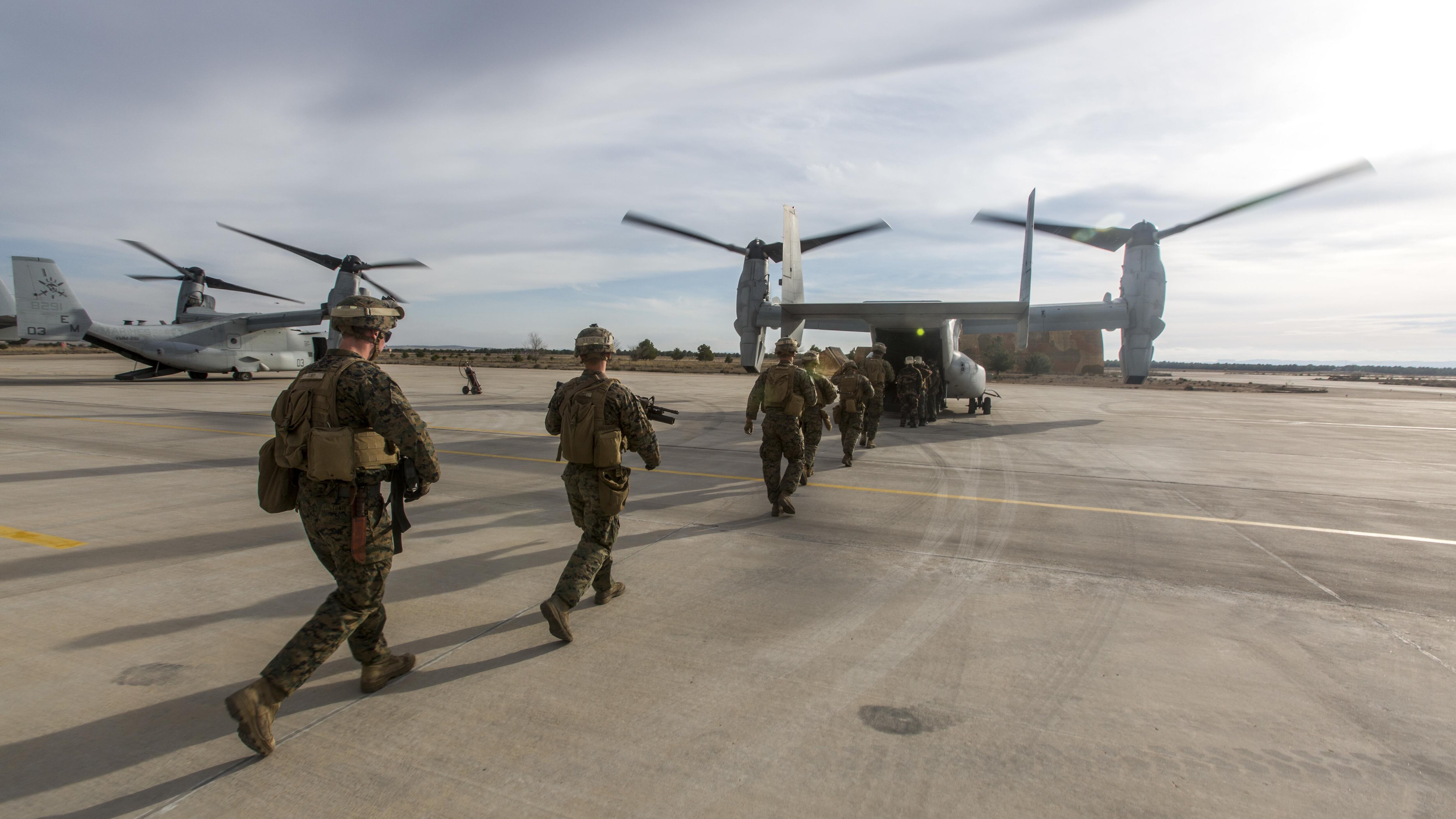The Marine Corps’ 26th Marine Expeditionary Unit has experimented with bringing State Department agents on to help communication and coordination for embassy reinforcements and noncombatant evacuation missions.
As part of the Composite Training Unit Exercise, known as COMPTUEX, one agent from the Diplomatic Security Service — the State Department’s law enforcement and security branch — accompanied an amphibious ready group, also called an ARG, with the MEU as it completed a simulated embassy evacuation.
Embassy evacuations have become a more common sight in recent years.
In July 2014, Marines aided in the evacuation of Embassy personnel from Tripoli, Libya, after violent protests broke out among rival militias in the country, and in February 2015 the American Embassy in Yemen was forced to evacuate as Iranian-backed Houthi rebels took over the country.
RELATED

The Marine Corps and the State Department have a long history of working with each other: Marines help provide security to U.S. embassies and consulates, reporting to State Department agents working as regional security officers.
While in emergency situations, noncombatant evacuations and embassy reinforcement are two of the MEU’s mission-essential tasks, the Marine Corps said.
"One of DSS’ strongest partners is the Marine Corps, who forward deploys with us to support embassy operations — especially during times of crises,” a State Department spokeswoman, said in an email to Marine Corps Times.
By 2016, the Corps created or reinforced Marine Security Guard attachments at more than 100 diplomatic posts in response to the 2012 attack on the diplomatic post in Benghazi, Libya, that resulted in the death of four Americans.
The Marine Corps also stood up three Special Purpose Marine Air-Ground Task Forces in order to increase the Corps’ ability to respond to the needs of diplomatic missions around the world.
The Corps has also had several units beyond the 26th MEU run embassy reinforcement and evacuation exercises.
In August, Marines from SPMAGTF-Crisis Response-Africa spent two days rehearsing the reinforcement of the American embassy in Bamako, Mali, according to a press release on the Defense Visual Information Distribution Service.
The Marines from SPMAGTF-CR-AF worked with a local Marine Security Guard detachment to respond to notional-complex enemy attack.
“The Marines did an excellent job and really knocked it out of the park,” Col. Eric Cloutier, the commanding officer of SPMAGTF-CR-AF, said in the release.
More recently the 31st MEU completed a 72 hour “no-notice” mission responding to a simulated chemical, biological, radiological and nuclear attack, according to a press release from the MEU.
The 31st MEU was first notified of the simulated attack at 4 a.m. Oct. 29, according to the release.
Within 36 hours of the notice, Marines with the MEU’s law enforcement and force reconnaissance and chemical response element landed at the simulated embassy 600 miles away.
First the chemical response Marines decontaminated the embassy, then role players staged a riot forcing the law enforcement detachment to detain several rioters and practice transferring them to the host nation’s police, the Marine Corps said.
“This exercise demonstrated our preparedness to rapidly support MARFORPAC missions countering potential threats against U.S. personnel within the Indo-Pacific region," said Col. Robert Brodie, the 31st MEU’s commanding officer, said in the release.
But the COMPTUEX with the 26th MEU was different than nearly any other embassy reinforcement exercise that Marine Corps has completed.
During the exercise, the Marine Corps and State Department tested how adding a Department of State Liaison Element could bring cultural and operations knowledge of the State Department to the MEU, while speeding up communication between the Corps and State Department.
“The DOSLE is a force multiplier for the MEU in any mission that may involve a host nation, an embassy, or any fraction of the Department of State,” Capt. Melissa Heisterberg, a spokeswoman for the 26th MEU, said in an email.
Having the Department of State Liaison Element "in the MEU’s ‘hip pocket’ rapidly expedites planning and coordination in a crisis moment, and it provides the MEU with accurate, timely information prior to MEU forces coming ashore to execute a mutually-supported mission,” Heisterberg added.
The ability to quickly communicate within the State Department while accompanying the Marines helped provide immediate information access, Special Agent Christopher Doggett said in a press release.
“There are systems we have on the Department of State side that if I could tap into from the ship I would be able to add more value,” Doggett said. “By being here in person I am able to feed information to the ARGMEU in real time."
Doggett said the program is still in the “proof of concept” stage and the exercise was meant to help “set the best practices and key lessons learned for the future.”
The State Department spokeswoman said this was the first experiment since the State Department and Marine Corps agreed to the idea in March, but added they “tested the waters” with an agent in 2018.
The value has been clearly demonstrated to leadership, she added, but staffing any permanent position will require offsets with other competing priorities.
The spokeswoman said the current plan is to send temporary duty agents for future support of the program.
"At the end of the day in operational situations we have the lives of Americans at risk,” said Doggett. “If the information I can provide more rapidly to the ARGMEU helps the end state, then everybody wins.”




